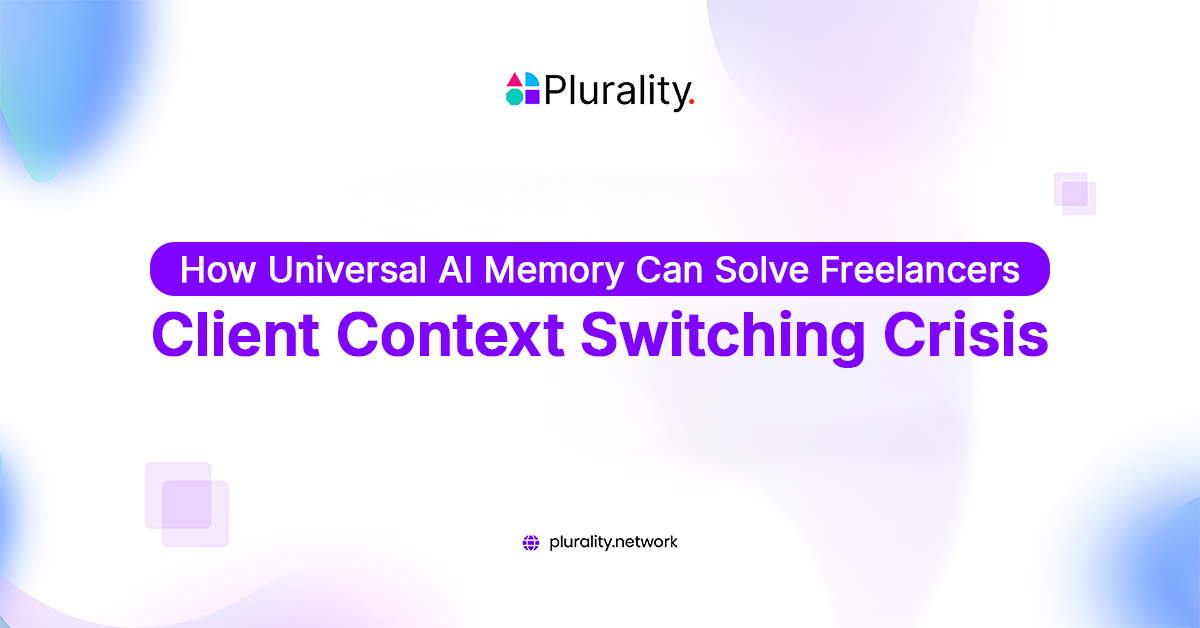Post-Cookie Era: Why Third-Party Cookies Are Being Phased Out And Its Impacts
By Alev • October 11, 2024

A meticulous shift in the digital world is reshaping experiences across the web. Third-party cookies were once the backbone of targeted advertising and personalization, but this will be the shadow of the past now. There will be a complete phaseout of third-party cookies as reported earlier, but not sure now for the grace period has been extended!
The leveling up of privacy regulations is a game-changer for businesses and their advertising solutions. It is not just limited to that; it also impacts consumer interactions in the digital landscape.
After the third-party cookies are phased out, there will be a huge focus on technologies that can enable first party data gathering – an arena where Plurality Network can provide huge benefit with in decentralized profiles solution. This convergence of Web3 and Decentralized Identity Solutions will be mainstream in the Post-Cookie Universe.
Decoding Third-Party Cookies
Third-party cookies assist advertisers and platforms in creating detailed user profiles by tracking their activities and behaviors. These small data files are placed on user’s devices for an in-depth analysis of user preferences. This data is then utilized for targeted advertising.
This data tracking method is not transparent; instead, it is opaque. Due to the increasing privacy concerns and pressing data ownership and security issues, the tracking form has been inspected critically.
For decades, advertisers and marketers have regarded third-party cookies as a valuable tool. Third-party cookies make it easy and accessible to deliver tailored ads, measure campaign effectiveness, and retarget users who previously showed interest.
However, collecting user data without explicitly consenting to it, such as browsing habits, personal information, and preferences, led to a significant privacy concern by questioning the reliance on these cookies.
Causes of Third-Party Cookies Phaseout
- Data Privacy Concerns: The modern web user knows data privacy rights. Over the past few years, privacy awareness among users has dramatically increased. It is, after all, a discomforting idea that one is constantly tracked and monitored across the web.
Third-party cookies collect vast data without the user’s full knowledge and consent. This problem led to the quest for a more privacy-focused solution to online tracking.
- Regulatory Pressures: Worldwide regulations prioritizing user privacy elevate this issue to a whole new level, such as the European Union’s General Data Protection Regulation (GDPR) and California’s Consumer Privacy Act (CCPA). These laws urge businesses to be more transparent about their data collection strategies, giving users more control over their data use.
The main reason cookies are being interrogated is their background operation and violation of many new data privacy standards.
- Tech Industry Leadership: Surprisingly, tech titans like Google, Apple, and Mozilla are leading the way in phasing out cookies. Apple’s Intelligent Tracking Prevention (ITP) feature in Safari and Mozilla’s Enhanced Tracking Protection in Firefox have already significantly limited the use of cookies for tracking.
Since Google Chrome accounts for most global browser usage, Google has announced plans to phase out third-party cookies entirely by 2024 as part of its Privacy Sandbox initiative.
- Changing Consumer Expectations: The evolution of the digital landscape has elevated consumer expectations equally. Users demand transparency and privacy without being willing to accept invasive tracking forms. Users will likely engage with brands that respect confidentiality and offer secure, consent-based data interactions.
So, user experiences are now another factor companies should consider to uplift their user engagement and personalization.

Phasing Out Third-Party Cookies: What’s at Stake?
- Digital Advertising Shaken-Up! The cookie phaseout has shaken the digital advertising world to the core. These little trackers have been vital for pinpointing audiences, retargeting, and measuring campaign success. With cookies disappearing, advertisers must get creative to connect with their audiences effectively. Tracking user behavior across sites will get trickier, making it harder to serve personalized ads and see how well they perform.
- First-Party Data Revolution Many businesses and advertisers are pivoting to first-party data strategies to adapt to user preferences. They collect information directly from users who visit their sites or engage with their services. This approach feels more personal and privacy-friendly since users interact directly with the brand. It’s all about building real connections instead of relying on third-party intermediaries.
- Tech Takeover! Fresh technologies fill the void by bidding farewell to cookies and non-consented data tracking. With the same intent, Google’s Privacy Sandbox is crafted to enable targeted ads while keeping user identities safe. More innovative projects, such as Federated Learning of Cohorts (FLoC) and Topics API, are shaking things up by grouping users based on shared interests instead of tracking every click.
- Personalization Reinvented For years, sites remembered user preferences to serve relevant content using third-party cookies—a backbone of personalized web experiences. However, they are on their way out now, so businesses require strict compliance to rely on first-party data and think outside the box to tailor web experiences for their esteemed users. The positive side of the scenario is that it is also an opportunity for the brands to innovate their medium of connection with their audience.
Decentralization and Web3: The Future Beyond Cookies
To align with user expectations, Plurality Network presents an outside-the-box vision of decentralized identity with the seasoning of privacy-preserving personalization. There are more than 50 studies featured by Forbes on the power of personalization. On average, over 70% users get frustrated when the content is not personalized. Plurality’s self-custodial profiles address many of the post-cookie era’s challenges. The profile offers a double win by providing an alternative to centralized identity and cookie-based data collection methods—that are history now!
- Self-Custodial Profiles: The predictive marker is the word “custody,” allowing users to control and decide when and where their data is shared, unlike the cookies would do. The smart profiles align with the demand for privacy and provide user autonomy in the digital world.
Providing apps with contextual data through interoperable profiles serves users a personalized experience without compromising user privacy.
- Personalization Without Cookies: Cookies were just a tiny piece of the big canvas of personalization. Plurality aims to enable the platforms to offer customization and personalization without relying on invasive and offensive tracking mechanisms.
The apps can understand user preferences through open data contexts presented by Plurality, which the user entirely controls. This strategy says it loud and clear: It is fully consent-based, transparent, and privacy-respecting.
- Privacy-Centric Advertising: Plurality offers a new way to marketers and advertisers with third-party cookies phasing out – the interoperable profiles. Delivering relevant content is easy with smart profiles without infringing on users’ privacy. The advertisers can access the anonymized user data with consent to provide targeted ads.
The post-cookie world will experience a fundamental shift emphasizing privacy, transparency, and user empowerment with an evolving spectrum of advertising strategies.
Conclusion
Currently, cookies got a grace period but it is going to be a big turn-off for marketers and advertises if they phaseout completely. However, the digital landscape keeps changing and great innovations will be ones that are user-focused. No offense, but the use of cookies fading away intends to create a user-friendly, privacy-respecting web.
Decentralized identity solutions offer elevated privacy to users complying with privacy and security regulations. Plurality Network’s idea of a self-custodial profile will continue to play a vital role in empowering users with privacy and personalization and advertisers with advertising and user engagement, which is a win-win for both aligning with modern privacy expectations.
It implies that the post-cookie era is more about offering privacy-centric solutions to improve the relationship between users, businesses, and data. Finding new tracking technologies is absolutely a detour. That is where Plurality comes in as an ally to help shape the transparent, ethical, and privacy-respecting web.



